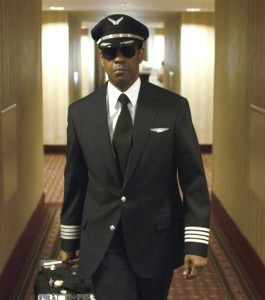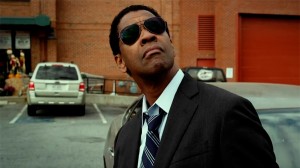 Well, Zemeckis still knows how to crash the hell out of a plane.
Well, Zemeckis still knows how to crash the hell out of a plane.
Returning to live action for the first time in a decade, the accomplished filmmaker directs Flight from a script by John Gattins, who spent years attempting to direct his script himself until Denzel Washington caught wind and pushed the throttle on the project by recruiting Zemeckis out of the depths of mo-cap films. It’s no surprise Zemeckis was attracted- when last he put physical camera to script he generated the epic Cast Away. Flight is also about a man who finds himself stranded after a traumatic plane crash, except rather than on an island, Whip Whitaker find himself trapped in his own life. Ultimately Zemeckis’ return to live-action is not unlike the plane crash he so exuberantly captures at its start- a turbulent, shaky ride that manages to save itself from an outright nosedive, but it still hits the ground pretty hard.
The film Gattins has written boasts a catchy premise- what if the heroic pilot who just saved 100+ people with a miraculous landing turns out to be a downward-spiraling alcoholic with no life worth speaking of? Not only is it a sharp subversion of one of America’s favorite heroic images, but it’s a complication of the dutiful, professional figure we all like to imagine is controlling the terrifying tin can rocketing from point A to point B- the pilot.
In this case, schlubby Whip Whitaker is a coke-snorting alcoholic that, if he hasn’t already hit rock bottom, is certainly heading towards it at terminal velocity. An atypical role for Washington, the actor bravely dives into a human being with few redeeming values except for the fact that he is a stellar pilot. The film’s basic moral quandary is contingent on the viewer’s belief that not only is the plane failure an act of God, but that Whitaker is truly the only pilot that could have saved the situation. When he’s not engaged in his one passion of piloting though, Whitaker is a tough guy to like. This is no Jason Reitman film about a magnetic guy with a mere hole in his heart- Washington actively subverts his own charisma by trotting out some of his typically overwhelming gusto and vocal confidence but in a transparently weak way.
The film wastes no time getting Whitaker into the plane, essentially opening with a single evocative scene (read: there’s an ostentatiously gorgeous woman prancing around naked while Whitaker groans at his ex-wife about money) and moving into the eponymous flight. After the intense crash sequence, the film becomes about how Whitaker, his pilot’s union, and the airline is going to deal with the fact that he was criminally stoned out of his mind when he enacted his miracle. While it appears for a while that this might become a sort of political or court-room drama, the film leaves all of that off screen once Whip sequesters himself from the public’s eye and deals with his addiction. He does so with the help of a heroine addict he meets in the hospital, and whose life we’ve gotten some idea about as her drug-induced crash happens simultaneously with Whip’s more literal crash (they meet in the hospital).
 What surfaces at this point and really prevents Flight from ever leveling into being a great film is a blatantly obvious tonal struggle. Though the film grabs laughs here and there and even features an extensive and sadly comic early scene, it never sets a tone as any kind of dark comedy. Despite plenty of tragic character struggling, it only partly settles in as a fully invested Drama about addiction because of an unwillingness to get too ugly. The legal scenario that seems like it will be such a big deal ends up serving as a awkwardly looming presence- a few meetings with the lawyer aside, this is a more personal story.
What surfaces at this point and really prevents Flight from ever leveling into being a great film is a blatantly obvious tonal struggle. Though the film grabs laughs here and there and even features an extensive and sadly comic early scene, it never sets a tone as any kind of dark comedy. Despite plenty of tragic character struggling, it only partly settles in as a fully invested Drama about addiction because of an unwillingness to get too ugly. The legal scenario that seems like it will be such a big deal ends up serving as a awkwardly looming presence- a few meetings with the lawyer aside, this is a more personal story.
Despite the character’s inner-ugliness, Washington can’t help but let loose with some funny deliveries and Denzel charm, but mostly he’s just a barely sympathetic loser with a big big problem. And then John Goodman busts into the joint with ridiculous hair and high-quality smack and suddenly everything’s a big laugh. His appearances in particular are jarring, even if Goodman’s chops means the character never feels entirely superflous (he’s the only one who truly cares for Whip that isn’t sleeping with him). Still, like the disastrous flight the film captures, Flight feels like a film that required Gattins and Zemeckis to do all kinds of tricks and inversions to keep the film steady and gliding, with an equally rough landing that, while not killing everyone as it surely could have, definitely leaves them all pretty banged up.
Also woven awkwardly through the film is the love story, which comes about as two people in a similarly circling whirlpool finally meet at the drain they’re both about to plunge to the bottom through. The film lacks the stones to go particularly ugly with Kelly Reilly’s heroin problem either, and it also struggles to cement any sense of true love between the two in the brief time they’re able to spend together. Co-dependence and a mutual understanding of addiction is surely enough to justify a relationship, especially a sexual one, but the film operates as if there’s more there- a gap the audience must fill, even if Washington and Reilly do have solid chemistry.
Despite the script’s rocky handle on tone, Whip’s addiction reads realistically and Washington is game and convincing at every key moment if, again, the film often seems averse to going particularly ugly with it. Still, the waxing and waning of his problem is handled sharply, and between Zemeckis’ coverage and Washington’s performance, the film sells the struggle, which is surely more interesting (and more difficult) than wallowing in the nasty stuff. We all know what vomit looks like, but not everyone has experienced the bone-deep desire to make a choice that has only bad endings to offer, so praise is due for correct priorities.
 It’s also interesting that we’re not watching a man’s life fall apart- that’s already happened. Instead we’re watching as his mistakes catch up to him in a more permanent way, almost as if he’s already died and God stands before him ready to judge. In this story God is in fact a governement hearing, and the story is about a man that even faced with that final judgement can’t get his shit straight.
It’s also interesting that we’re not watching a man’s life fall apart- that’s already happened. Instead we’re watching as his mistakes catch up to him in a more permanent way, almost as if he’s already died and God stands before him ready to judge. In this story God is in fact a governement hearing, and the story is about a man that even faced with that final judgement can’t get his shit straight.
Ultimately this is one of those movies that really all comes down to one moment in a man’s life, and one key moment of recognition for the audience. One might be reminded of The Informant which in one single shot delivers a revelation to the audience about how a man operates in his world, while at that same moment shifts the story by taking the character one lie past what anyone would ever again believe. In Flight a similar effect occurs with the ending, which puts a spin on the whole approach of the film and even interestingly justifies some of the triteness the film treads on during its conclusion. It’s too interesting to spoil here, but as the film piles on the dysfunction of Whitaker’s struggle, a long held back look at a key part of his life works wonders. What becomes clear is that even though this crash and the scrutiny it brings has shoved Whip Whitaker’s figurative fish tank off the table, the water had long drained from it already, leaving him flopping and gasping.
John Gattins continues to develop as a screenwriter with great ideas that feel like they need a few more polishes while Zemeckis continues capturing things beautifully, if often ostentatiously. Not a bad re-debut at all, and it’s refreshing for him to be making a thoroughly adult drama with a touch of spectacle that all boils down to character at the end of the day. Like Whip Whitaker himself, Flight is a film that’s tough to love, but there’s a difficult-to-pin down characteristic that keeps you connected. Perhaps it’s the addict in all of us that can relate to the demon in the mini-bottle and the hope that maybe one day we’ll manage to finally land safely.
Rating: 




Out of a Possible 5 Stars